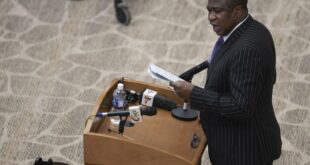THE cash-strapped National Railways of Zimbabwe (NRZ) is spending approximately US$3,5 million annually towards hiring locomotives from foreign companies, with revelations that the rail firm is currently battling a dwindling revenue base, the Zimbabwe Independent can report.
The NRZ is the principal transporter of heavy cargo, and revenues have been on a perennial decline due to shrinking business volumes owing to a depressed economic environment.
The Auditor-General, Mildred Chiri has on several occasions rapped the parastatal over its losses with its liabilities exceeding its assets by nearly ZW$875 million (US$5,8 million).

Responding to questions by the Independent, NRZ acting spokesperson Martin Banda said the transporter was working on improving its equipment to reduce operational costs emanating from hiring equipment.
“NRZ is hiring locomotives for approximately US$150 000 per month and wagons for approximately US$33 per day from foreign companies,” he said.
“There is a need to reduce the number of hired locomotives and work towards use of own equipment. We have a problem of the pulling capacity, for ours to be reliable we need them in tandem to supplement that.”
Banda said the NRZ requires a US$2 billion capital injection to revitalise operations.
“NRZ has been in perennial decline mode for some time owing to shrinking business volumes as a result of depressed economic activities coupled with failure to provide an efficient transportation service,” he said.
“The result has been a dwindling revenue base, unsustainable overhead costs, failure to acquit salary bills and other statutory obligations on time.
“We intend to repair a minimum of five locomotives in 2022 and rely on our own resources in terms of locomotives by mid-2023,” Banda added.
He said there was a need to come up with export fit NRZ wagons that are accepted in foreign countries, such as South Africa.
“Key to this is the conversion from vacuum to air-brake system. The air-brake system will also allow NRZ to haul longer traffic from around 19 wagons with vacuum braking system to around 35 wagons per each locomotive under air-break,” Banda said.
“This will reduce operational costs and improve tonnage delivery per trip. This project has board approval and is being implemented effective February 2022.”
He also revealed that Zimbabwe’s rail was in a bad state due to lack of repair and maintenance over the years, leading to derailments during the rainy season.
NRZ currently has 250km of rail under caution and there is an intention to reduce these cautions at the rate of 50km per year.
Banda said the parastatal would give priority to rehabilitating cautious areas along the Victoria Falls to Harare line.
He added that passenger trains have also not performed well owing to the state of infrastructure, age and poor condition of the coaches.
Banda also highlighted the challenge of vandalism on railway infrastructure, especially in mining areas.
Government last year revoked a recapitalisation deal that NRZ and the Diaspora and Infrastructure Development Group (DIDG) signed in 2017, resulting in a US$235 million lawsuit for breach of contract.
The contract was cancelled on claims of non-performance while the South Africa-based DIDG was accused of failing to meet agreed terms and conditions for the contract.
Banda said the NRZ was in contact with various foreign companies that are interested in investing in the bulk national transporter.
“We do not want one person to supply us with everything and we learnt our lesson with DIDG. There is a company from Turkey that was identified for infrastructure, some from Indonesia, Russia and India for rolling stock but the process is done at the government level,” he said.
“NRZ has been in perennial decline mode for some time owing to shrinking business volumes as a result of depressed economic activities coupled with failure to provide an efficient transportation service,”
“NRZ has been in perennial decline mode for some time owing to shrinking business volumes as a result of depressed economic activities coupled with failure to provide an efficient transportation service,” he said.
“The result has been a dwindling revenue base, unsustainable overhead costs, failure to acquit salary bills and other statutory obligations on time.
“We intend to repair a minimum of five locomotives in 2022 and rely on our own resources in terms of locomotives by mid-2023,” Banda added.
He said there was a need to come up with export fit NRZ wagons that are accepted in foreign countries, such as South Africa.
“Key to this is the conversion from vacuum to air-brake system. The air-brake system will also allow NRZ to haul longer traffic from around 19 wagons with vacuum braking system to around 35 wagons per each locomotive under air-break,” Banda said.
“This will reduce operational costs and improve tonnage delivery per trip. This project has board approval and is being implemented effective February 2022.”
He also revealed that Zimbabwe’s rail was in a bad state due to lack of repair and maintenance over the years, leading to derailments during the rainy season.
NRZ currently has 250km of rail under caution and there is an intention to reduce these cautions at the rate of 50km per year.
Banda said the parastatal would give priority to rehabilitating cautious areas along the Victoria Falls to Harare line.
He added that passenger trains have also not performed well owing to the state of infrastructure, age and poor condition of the coaches.
Banda also highlighted the challenge of vandalism on railway infrastructure, especially in mining areas. ZimbabweIndependent
 Nhau News Online News that is accurate, reliable, trustworthy!!
Nhau News Online News that is accurate, reliable, trustworthy!!
